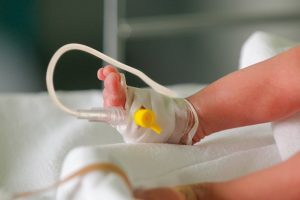The safety of parenteral nutrition (PN) remains a concern in preterm neonates, impacting clinical outcomes and health-care-resource use and costs. This cost-consequence analysis assessed national-level impacts of a 10-percentage point increase in use of industry-prepared three-chamber bags (3CBs) on clinical outcomes, healthcare resources, and hospital budgets across seven European countries estimating the impact on compounding error harm and bloodstream infection (BSI) rates, staff time, and annual hospital budget.
 Due to mostly human errors during the compounding and preparation processes, manually prepared triple-chamber-bags (3CB) run a higher risk of harming preterm babies than industry prepared ones, because of compounding errors or touch contamination. Dedicated facilities for pre-processing are much safer as it automates certain steps and has specialised staff on disposal. The study at hand represents a cost-consequences analysis and proposes that the lower error afflicted industry prepared 3CB’s are also correspondent to lower medical costs in different medical cost centres due to a lower harm rate. The model that supports this claim has a 10 percent increased ratio in industry prepared 3CB’s on top of the real estimated 7 percent, which is an average out of the seven countries which the model is applied to. A cost-consequences analysis with interviews was performed to assess PN use in preterm babies born in Belgium, France, Germany, Italy, Portugal, Spain, and the UK. In these countries, around 265,000 preterm neonates born prior to 37 weeks of gestation are estimated to be born annually of whom approximately 133,000 (52%) receive PN. However, data availability is limited and data quality varies even from hospital to hospital, due to the varying degree of documentation of medical errors and infant harm rates. The key question is how does a 10% percent increase in industrial prepared 3CB’s alter a hospital’s costs related to compounding errors, bloodstream infections, nutrition and labour.
Due to mostly human errors during the compounding and preparation processes, manually prepared triple-chamber-bags (3CB) run a higher risk of harming preterm babies than industry prepared ones, because of compounding errors or touch contamination. Dedicated facilities for pre-processing are much safer as it automates certain steps and has specialised staff on disposal. The study at hand represents a cost-consequences analysis and proposes that the lower error afflicted industry prepared 3CB’s are also correspondent to lower medical costs in different medical cost centres due to a lower harm rate. The model that supports this claim has a 10 percent increased ratio in industry prepared 3CB’s on top of the real estimated 7 percent, which is an average out of the seven countries which the model is applied to. A cost-consequences analysis with interviews was performed to assess PN use in preterm babies born in Belgium, France, Germany, Italy, Portugal, Spain, and the UK. In these countries, around 265,000 preterm neonates born prior to 37 weeks of gestation are estimated to be born annually of whom approximately 133,000 (52%) receive PN. However, data availability is limited and data quality varies even from hospital to hospital, due to the varying degree of documentation of medical errors and infant harm rates. The key question is how does a 10% percent increase in industrial prepared 3CB’s alter a hospital’s costs related to compounding errors, bloodstream infections, nutrition and labour.
Even though the study has some limitations such as the wide variability in PN protocols and compounding methods across Europe, one can conclude that in every setting even a marginal increase in industrial sourced 3CB’s are hugely beneficial in terms of health outcomes and hospital-resource saving measures. In support of these goals, policies need to be developed to further improve PN protocols for preterm neonates.
Full list of authors: Kriz, Alexander; Wright, Antony; Paulsson, Mattias; Tomlin, Stephen; Simchowitz, Venetia; Senterre, Thibault; Shepelev, Julian.
Paper available to view at https://bit.ly/3kp2be7

